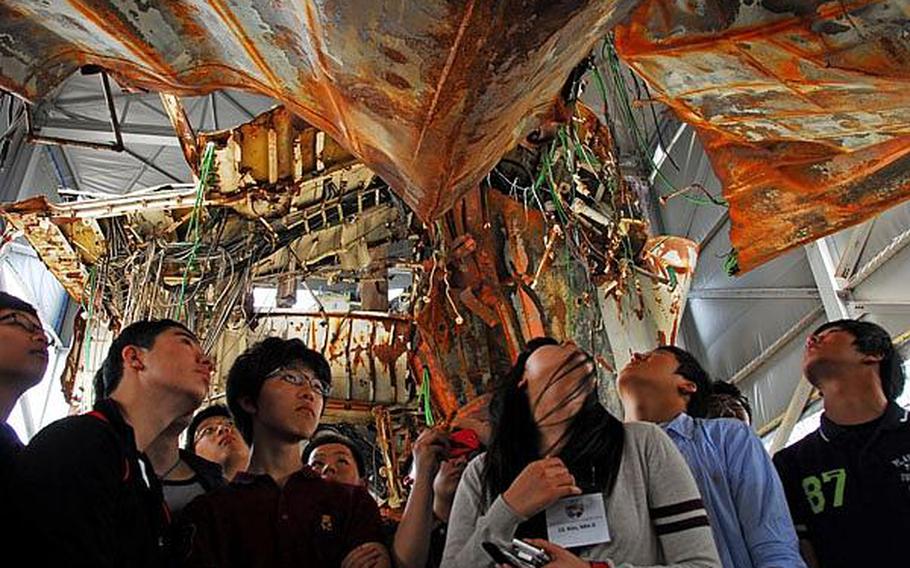
Participants in the Good Neighbor English Camp look Wednesday at the wreckage of the Cheonan, the South Korean ship hit last year by a North Korean torpedo. Sixty-six South Korean teenagers participated in the week-long camp. (Ashley Rowland/Stars and Stripes)
PYEONGTAEK, South Korea — Staring up at the rusted underbelly of the broken ship, a group of South Korean teens were confronted with hard evidence of something they knew but had largely ignored during their short lives: their country is at war.
Snapping photos Wednesday as their guide pointed to signs of a torpedo strike — bent rudders, round “bubble marks” from the blast, and the upward bending of the ship’s metal where it violently split in half — many said they were struck by the extent of the damage to the Cheonan, the South Korean warship sunk in a North Korean attack last year, even though they had seen footage of the ship’s wreckage on television.
“The North Korean weapon was so powerful,” said 16-year-old Lim Joon-seok, one of 66 students who visited the Cheonan at a South Korea naval base as part of U.S. Forces Korea’s annual Good Neighbor English Camp. The weeklong cultural immersion program gives students the opportunity to live with a military family and visit U.S. bases and schools. During the week, they visited military-themed sites, including the War Memorial of Korea museum in Seoul, went bowling, attended a cookout and a pizza party.
The week began with a visit to the heavily-armed Joint Security Area on the North-South border, something that few South Koreans do – either for lack of interest or because of the lengthy, required security checks.
Foreigners can easily visit the JSA by registering with one of the many tour companies that offer day trips there. South Koreans must apply to visit three months in advance because it is a “dangerous and sensitive place” for them, a National Intelligence Service spokesman said, though she did not explain why South Koreans face the extra security checks.
Many of the students said they were struck by the seriousness of the mood at the DMZ, which they had seen only in movies.
“I thought soldiers talked with each other, just watched each other and talked, that kind of thing,” said Lim, who said he had learned nothing in school about the DMZ except that it existed. “But when I went there, I thought it was really a war. I realized that the war in Korea is not finished.” The camp is USFK’s top youth outreach program in South Korea is designed to introduce future South Korean leaders to its mission, USFK commander Gen. Walter Sharp said in a statement posted on the command website.
“The goal is that the camp participants will become 'Goodwill Ambassadors' as they relay their experiences to friends, classmates, teachers and families,” he said.
Half of the students at the English Camp are from Seoul, home to approximately half the country’s population. The other half are from Daegu and Pyeongtaek, home to the bases that will eventually serve as hubs for the U.S. military when it returns its installations in and north of Seoul to South Korea later this decade.
Unbeknownst to most of the camp participants, three of the students are North Korean defectors. Camp officials decided not to release their identities for their safety and because of the stigma in South Korea associated with being a defector.
Yi Hee-il, an English teacher at Mun Jung High School in Seoul - and one of two teachers to participate in the camp - said the trips to the DMZ and to see the Cheonan were an awakening of sorts for the students, giving them a chance to see the tensions on the peninsula first-hand.
He said many events like the camp are needed because some in South Korea view the Americans as colonizers and ignore past provocations from North Korea.
“Some leftist teachers, especially young teachers, teach the young students that because of the American imperialists, the Korean peninsula cannot be unified,” said Lee, who had not visited the DMZ before last week. “So as long as American soldiers are stationed here, [those teachers say] the reunification of the peninsula is impossible.”
The two Koreas have remained technically at war since the 1953 armistice that ended active conflict during the Korean War. Tensions between the two Koreas rose dramatically after the Cheonan sinking in March 2010, which killed 46 sailors. A South Korean-led international investigation placed blame for the sinking on a North Korean torpedo, though the North has denied any involvement in the attack.
The North also bombed a South Korean island last November, killing four people and triggering a war of words between the North and South that threatened to spiral into a larger conflict.
Like several other students, Hong Ki-tae of Pyeongtaek was surprised at the stony silence between the North Korean and South Korean soldiers at the DMZ. He was also surprised to see a physical line separating the two countries, and had expected to see North and South Korean soldiers talking to each other as they do in “JSA,” a popular movie from 2000 in which two North Korean soldiers are killed by a South Korean soldier.
Choi Su-bin, 15, said that after visiting the DMZ she was struck by the sadness of the divided countries.
“I think we cannot be one,” she said. “Never.”
Yoo Kyong Chang contributed to this story.